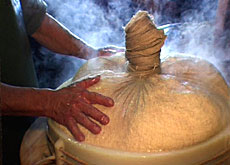
Making a living the hard way

Life for cheese makers in the Alpine pastures of Gruyère is getting harder, as foreign competition squeezes prices.
swissinfo’s Julie Hunt paid a visit to the Piller family, which is facing an uncertain future on the pastures of Charmey in canton Fribourg.
There are 30 Gruyère cheese producers in this region, and about a dozen of them are families eking out a meagre existence in Alpine huts.
It is the simplicity of mountain life that attracted the Piller family to Vounetz ten years ago. Their stone and wood chalet, 1630 metres above sea level, has breathtaking views and they enjoy cautious visits by timid Alpine animals never seen in the valleys below.
The nearby cable car affords easy access for visitors of the human kind. Charmey tourist office brings groups here to watch cheese making the hard way, without sophisticated equipment. The Pillers are allowed to sell up to 500kg of cheese per year to the tourists.
Tough times
Even so, times are tough, and getting tougher. Germain bemoans the rising costs of insurance, farm machinery, fuel and ingredients for cheese making.
“The price of cultures for the cheese has doubled over the past three years, but we don’t earn any more,” he says.
Meanwhile, demand for Gruyère cheese at home and abroad continues to grow. But, faced with stiff competition from foreign cheese producers, the market price remains the same.
A cooperative serving 30 producers sells the Pillers’ cheese for between SFr20 and SFr24 per kilo. The family receives SFr10.60 per kilo.
Despite his cheerful attitude, Germain is pessimistic about the future. “If the government cuts our subsidies, it will spell the end. And then what will happen to the Alpine pastures? They will get overgrown. Tourists won’t want to come here any more.”
Top marks
Quality is certainly not a problem for the Pillars. Federal inspectors recently awarded their brand of Gruyère a bumper 19.7 on the 20-point cheese quality scale.
Germain Piller attributes their success to the lush Alpine pastures on which cows graze, and traditional production methods which give each cheese its own unique aroma.
Life on the farm
Cheese producing on the alpine pastures has long been a labour of love. Germain, his wife Denise and son Beat, get up at 0430 every morning, and make cheese everyday during their five-month spell on the mountaintop.
In the winter, their return to their home in the village below, where they have a dairy. “We don’t get holidays,” Beat says. “But we don’t really need them because it’s a good life up here.”
The milk collected from their 35 cows in the evening becomes cheese the following day.
Scorching
First it’s heated in a big copper pot over a wood fire. Ingredients are added to make curds and whey. When solid lumps appear in the cauldron, Beat washes his arms in cold water before plunging them into the scorching concoction, and fishing out the cheese lumps with a net.
“At the beginning of the season it really stings. But then the skin on my arms gets tough, and I get used to it.”
Beat acknowledges that they are swimming against the tide: “We have to work harder and harder to make the same amount of money.”
But he takes a more optimistic approach towards the future, convinced that he will be able to live out his days on the mountaintop. “We farmers will stick together and help each other to get by”.
by Julie Hunt
The Pillers – a family of traditional Alpine cheese producers – show swissinfo how high quality Gruyère is made on a mountain top without the use of sophisticated modern equipment. But can they continue to eke out a living in an atmosphere of rising costs and static market prices? Father and son have differing visions of the future.
The Pillers stay at the mountain top from May to September
They produce one or two cheese per day, weighing 25-30 kg each
They produce 3-4 tons of cheese per year
They have 35 cows

In compliance with the JTI standards
More: SWI swissinfo.ch certified by the Journalism Trust Initiative





























You can find an overview of ongoing debates with our journalists here . Please join us!
If you want to start a conversation about a topic raised in this article or want to report factual errors, email us at english@swissinfo.ch.